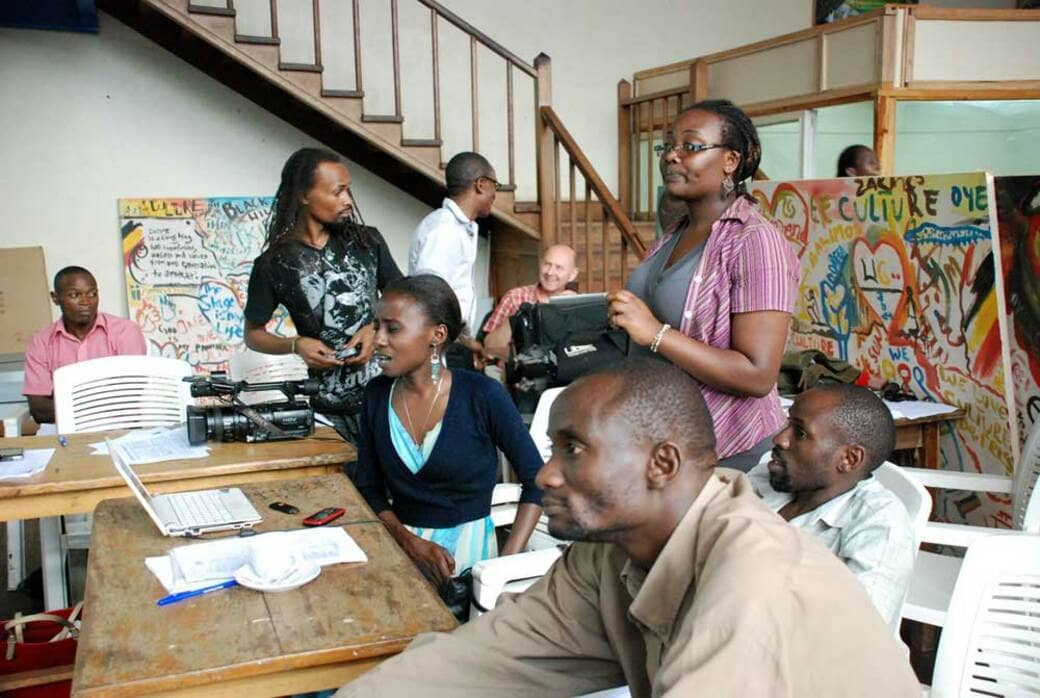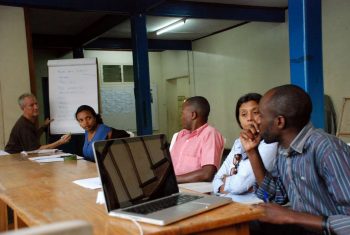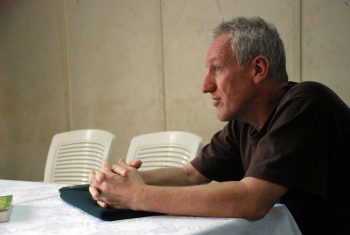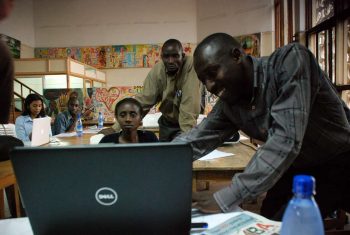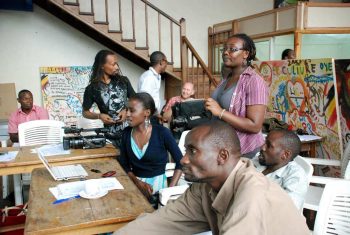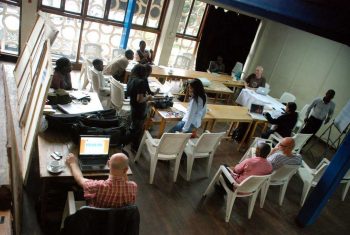- When: 12 – 18 September 2011
- Where: Kampala – National Theater
Introduction
Since 2008, Bayimba Cultural Foundation has implemented a wide range of activities aimed at stimulating creativity and professionalism in the arts sector and promoting inter- and intra-disciplinary artistic collaborations. Having organized a series/variety of training workshops for different disciplines of arts, Bayimba Cultural Foundation identified a need to equip selected local arts journalists in Uganda with further basic theoretical knowledge and research skills, techniques and arts journalism craftsmanship as an important element in its efforts to develop the arts sector in Uganda.
Rationale for arts journalism training
Arts journalism often refers to coverage of arts and culture, concerned with reporting and discussions on arts (including and not limited to film, literature, music, theatre and architecture) and culture. Criticism often falls under the umbrella of arts journalism but to an extent, the term is not as prevalent as it once was.
African art is recognized as a major artistic and aesthetic resource, but African reporting on African art products does little to address this reality of the immense potential and contribution of the arts. Much of the African arts reporting and discussions marginalize the arts, downsize its aestheticism to entertainment gossip, eroding appreciation of homegrown arts as well as its economic basis. Africa must generate an African-centred appreciation of its artistic wealth, managing and stimulating home grown creativity.
In Uganda, the challenges facing arts journalism are well known, with no clear solutions yet emerged to develop and sustain local relevant arts and culture reporting. There is little specialized training for art reporting while media houses and platforms do not necessarily give an audience and space to arts and culture reporting. As a result, the quality of most arts and culture reviews is not at standard of news and business reporting while appreciation of arts across the country is very poor.
With the abundant writing, story telling and journalist pedigree of the arts and culture in Uganda, there is a need to strengthen the role of arts journalism, emphasize its understanding and develop a skillful force that generates dynamism in arts and culture reporting and critique. An opportunity has emerged to find new, engaging, and sustainable models for arts journalism and to develop bold innovative thinking to show a path forward.
The training workshop seeks to rethink how traditional media systems function; how the media landscape is changing, harnessing the latest tools and technology to make the transition to the new information technology environment; how to engage new audiences, using information portals with innovative methods to cover, inspire and engage with communities through arts and culture by providing platforms for high quality arts and culture criticism and reportage.
Objectives of the training
The training workshop aims at contributing to the development of a well informed and creative force of arts journalists, representing and writing about the arts in their aesthetic and artistic values while it seeks to stimulate collaborative works of arts journalists and partner media associates. The workshop is designed to stretch arts journalists thinking and practical skills and techniques and is set to achieve the following objectives:
- Raise standards of and appreciation for arts journalism
- Motivate an economic interest for quality arts and culture coverage
- Generate a peer-to-peer network of arts reporters (print, electronic and audiovisual) to collectively share professional works
- Introduce participants to the latest practical tools, theories and hands on techniques to story making and production
Set-up of the training
The arts journalism training is scheduled for 12th-18th September 2011, prior and during the 4th edition of the Bayimba International Festival of the Arts. The training will be held at the National Theatre CICP, which is the location of the Festival.
Committed candidates with an arts journalism background will be invited to apply and express their interest in participating in the training by submittin:
- complete entry form,
- short profile/biography,
- sample of publication/production about the arts,
- motivation for their candidacy and
- support letter from the current media house.
A balanced number of 10 candidates comprising of print, television, radio and web media journalists, between 20-45 years, will be selected by the training faculty. Candidates will come from Uganda mainly and its countryside’s. International participants may attend at their own cost however. To ensure that the objectives of the training are achieved, the training faculty will also identify specific candidates depending on the need for outreach.
Selected candidates are expected to attend the whole period of training with their own writing and production materials (laptops and photo cameras); audiovisual equipment will be provided during the training. Participants will be provided with food, drinks and transport refund and a compensation payment for the articles published/production items made.
Training faculty
The arts journalism workshop faculty is made of exceptional trainers/mentors who will also take on the role of advising participants.
Training methodology
The foundation of all good arts reporting rests in a strong and informative writing, reporting and production style incorporating technical knowledge and craftsmanship, passion for the subject and appreciation of arts pedigree and contemporary scene. A high quality of theoretical and technical input will feature throughout this training.
The training workshop will have the following concrete outputs:
- Well-researched and analyzed comprehensive feature-length articles to be published/broadcast across local media networks in diverse form (1000-1200 words);
- Contribute at least 1-2 (preferably more) stories a day to a 2,000 hard copy print and online Bayimba Festival Newspaper (300-700 words);
- Photography assignments will produce daily reportage photos for every story;
- Several podcasts will be produced and released;
- Online blogs will be produced;
- Publication of developed materials with various media associations and various online web-media;
A detailed itinerary (below) with preparatory work and basic information/definition and web based research sources will be provided to participating candidates with assignments to develop individual stories and productions reports that will be published as premier feature-length articles and photo essays, most of which will appear in the daily Bayimba Festival Newspaper – guided and analyzed to the highest standards of reportage. Other stories and production reports will appear in associated media outlets.
The first two days of the workshop (13th-15th September), the faculty will guide participants in theories of storytelling through writing, editing and producing informative content for print and audio-visual publication. The following days of the workshop (16th September) will focus on practical exercises creating dummy runs for interviews or stories about the Festival, Festival artists teasers that will feature in the first edition of the Bayimba Festival Newspaper. These will require in-depth knowledge of arts disciplines and research, cross-cutting themes and stories in Ugandan arts with a perspective that expresses underlying narratives of aesthetic and artistic values. The last days of the workshop (17th -18th September) will focus on print and publication of artistic articles and Bayimba’s coverage and will finish off with full-length articles as well as supplementary to be published in associate/partner media outlets.
Tutors
Thomas Bjørnskau
Everybody needs feedback. Artists in particular hunger for responses. To critique means to separate and distinguish in order to judge something fairly. It is not about criticism. It is about pushing the artists forward. Art journalists should be passionate about arts and the effects their stories will have.
Ayesha Ismail
I am passionate about storytelling. Whether it’s a court case, political happening or what an artiste does, I treat it like breaking news. We complain that Arts pieces are the first to be dropped when editors decide what stories make it. But our job is to compel audiences to sit up – to make Arts the news.
Andrew Whaley
Art reveals who and what we are and, sometimes, why. If we don’t own it and fight for it, it dies, or goes elsewhere. If we don’t value it we cheapen ourselves. Good arts journalists fight to keep expression alive. The best, from what they witness, make art anew…
Moses Serugo
The arts journalist is principally a scribe, documenting for posterity yet validating the artiste at present.
Nathan Kiwere
A picture has variously been touted as a potent symbol capable of speaking a thousand words. The broader spectrum of the arts can probably transcend this age-old adage to speak even millions of words. It is quite hard to imagine what the world would be like without art.
